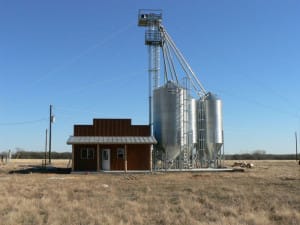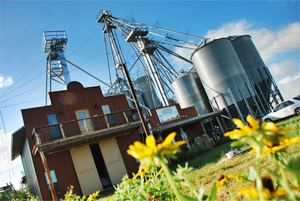by Elizabeth Wolf
[Cameron Molberg manages Coyote Creek Farm, just east of Austin. It is the only commercial source of organic feed between Texas and North Carolina. In early 2015 he was nominated for a position on The Cornucopia Institute’s formal Policy Advisory Panel.]
 |
 |
“You are what your animal eats,” says Cameron Molberg, general manager of Coyote Creek Farm, a certified organic livestock producer and the first commercial organic feed mill in Texas.
“It’s shocking what’s in conventional feed,” Cameron continues, citing the pesticides, herbicides, hormones, antibiotics, and GMOs the stuff is riddled with. “At Coyote Creek, we’re producing a feed product for the Olympic athlete of livestock. You don’t feed an Olympian candy bars and junk food.”
The livestock all-stars for which the mill produces custom feeds include everything from dairy cows and turkeys to poultry, sheep, goats, rabbits — even crickets (a protein source in many countries and, increasingly, for Paleo eaters in the U.S.). Backyard chicken enthusiasts are another burgeoning market for Coyote Creek. “Customers will pay $15 to $20 to ship a single bag of feed,” Cameron notes. “People are trying to incorporate organic production practices on even a micro scale.”
Coyote Creek Farm is the legacy of one Jeremiah Cunningham, whose cancer diagnosis sparked a passion for soil fertility, healthy food, and restoring the family farm community. Jerry purchased the ranch in 1997 and by 2005 had organic certification.
One day he got a call from an old friend in Austin — John Mackey, CEO of Whole Foods. Would Jerry raise more chickens to produce “pastured organic” eggs for Whole Foods? Jeremiah Cunningham’s “World’s Best Eggs” launched in 2005. Today, the brand (garnering the highest possible rank on Cornucopia’s Scorecard) sells over 2 million eggs each year.
With not a single organic feed mill in the region at the time, Jerry was forced to source organic poultry feed from the Midwest, 900 miles away. This was an expensive and unreliable solution. To ensure the security and high quality of his egg farm, Jerry launched his own modest mill in 2007. He soon found there was a hungry, untapped market for organic feed across the South; quickly he expanded and commercially licensed the mill.
From the early days, when the mill sold to 10 to 15 family farms, it’s grown to do business with about 200 small-scale and direct-market family farmers. Consumer appetite for local and organic food in the area remains keen. “In the five years I’ve been at the farm,” Cameron says, “the number of farmers markets in Austin alone has tripled. People want a good product and they want an honest product.”
The mill customers who really “get it,” says Cameron, are the farmers who previously were forced either to buy conventional feed or not produce at all. The mill has bolstered not only their livelihood but their peace of mind.
On the supply side, area grain producers have been empowered to grow organically, knowing they have a ready market for their crops.
Cameron’s former professors at Texas Tech University could learn a thing or two from the revitalizing example of Coyote Creek Farm. They snickered at the mere mention of “organic” when Cameron studied conventional animal science and institutional management there. But tours of meat-packing plants, coupled with memories of his grandparents’ bountiful, chem-free garden, which fed a family of seven, ultimately nudged Cameron onto an organic path.
After opening two sustainably sourced restaurants in Austin with friends, Cameron was hired as general manager at Coyote Creek. He worked alongside Jeremiah Cunningham, a strong collaborator with Cornucopia in its work, until the founder’s passing in 2013.
“Every small town used to have a feed mill in it,” Cameron explains. The supply chain depended upon it. But the USDA’s “get big or get out” edict shut most of them down along with the family-scale farms they supported. Opportunities in rural America withered.
“Jerry had a vision and we’re trying to realize it as much as possible,” says Cameron. “We’re going to keep pushing forward to increase localized production and get farmers back on the ground, producing what they want to produce.”
This story was previously published in the Summer 2015 Cultivator, Cornucopia’s quarterly newsletter.

